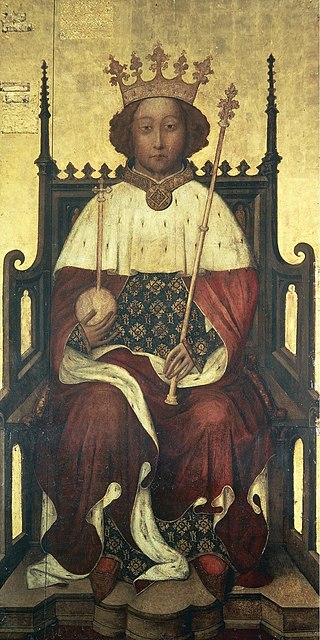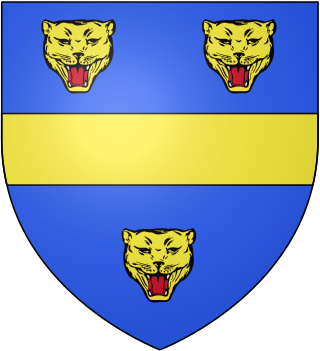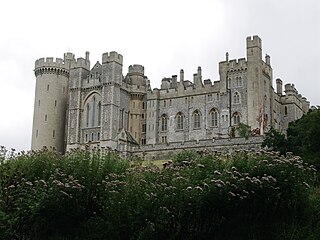Related Research Articles

Richard II, also known as Richard of Bordeaux, was King of England from 1377 until he was deposed in 1399. He was the son of Edward, Prince of Wales, and Joan, Countess of Kent. Richard's father died in 1376, leaving Richard as heir apparent to his grandfather, King Edward III; upon the latter's death, the 10-year-old Richard succeeded to the throne.

Thomas de Mowbray, 1st Duke of Norfolk, KG was an English peer. His family was a venerable one, and by the time Thomas reached adulthood, they were extremely influential in national politics. He claimed a direct bloodline from King Edward I. His father died when Thomas and his elder brother were young. John soon died, and Thomas inherited the Earldom of Nottingham. He had probably been friends with the king, Richard II, since he was young, and as a result, he was a royal favourite, a role he greatly profited from. He accompanied Richard on his travels around the kingdom and was elected to the Order of the Garter. Richard's lavish dispersal of his patronage made him unpopular with parliament and other members of the English nobility, and Mowbray fell out badly with the king's uncle, John of Gaunt.

Thomas of Woodstock, Duke of Gloucester was the fifth surviving son and youngest child of King Edward III of England and Philippa of Hainault.

Ralph Neville, 1st Earl of WestmorlandEarl Marshal, was an English nobleman of the House of Neville.
John Holland, 1st Duke of Exeter, 1st Earl of Huntingdon, KG, of Dartington Hall in Devon, was a half-brother of King Richard II (1377–1399), to whom he remained strongly loyal. He is primarily remembered for being suspected of assisting in the downfall of King Richard's uncle Thomas of Woodstock, 1st Duke of Gloucester (1355–1397) and then for conspiring against King Richard's first cousin and eventual deposer, Henry Bolingbroke, later King Henry IV (1399–1413).

Richard Fitzalan, 4th Earl of Arundel, 9th Earl of Surrey, KG was an English medieval nobleman and military commander.

Sir Thomas Erpingham was an English soldier and administrator who loyally served three generations of the House of Lancaster, including Henry IV and Henry V, and whose military career spanned four decades. After the Lancastrian usurpation of the English throne in 1399, his career in their service was transformed as he rose to national prominence, and through his access to royal patronage he acquired great wealth and influence.

The Lords Appellant were a group of nobles in the reign of King Richard II, who, in 1388, sought to impeach five of the King's favourites in order to restrain what was seen as tyrannical and capricious rule. The word appellant — still used in modern English by attorneys — simply means '[one who is] appealing'. It is the older (Norman) French form of the present participle of the verb appeler, the equivalent of the English 'to appeal'. The group was called the Lords Appellant because its members invoked a procedure under law to start prosecution of the King's unpopular favourites known as 'an appeal': the favourites were charged in a document called an "appeal of treason", a device borrowed from civil law which led to some procedural complications.

Michael de la Pole, 2nd Earl of Suffolk was an English nobleman who supported Henry IV against Richard II during the turmoils of the late 14th century. He died during the Siege of Harfleur in 1415. He was the eldest son of Michael de la Pole, 1st Earl of Suffolk and Katherine Wingfield, daughter of Sir John Wingfield.

The Merciless Parliament was an English parliamentary session lasting from 3 February to 4 June 1388, at which many members of King Richard II's court were convicted of treason. The session was preceded by a period in which Richard's power was revoked and the kingdom placed under the regency of the Lords Appellant. Richard had launched an abortive military attempt to overthrow the Lords Appellant and negotiate peace with the kingdom of France so he could focus all his resources against his domestic enemies. The Lords Appellant counteracted the attempt and called the parliamentary session to expose his attempts to make peace. Parliament reacted with hostility and convicted almost all of Richard's advisers of treason. Most were executed and a few exiled. Parliament was dissolved after violence broke out in Kent and the Duke of York and his allies began objecting to some executions. The term "merciless" was coined by Augustinian chronicler Henry Knighton.

The Wonderful Parliament was a session of the English parliament held from October to November 1386 in Westminster Abbey. Originally called to address King Richard II's need for money, it quickly refocused on pressing for the reform of his administration. The King had become increasingly unpopular because of excessive patronage towards his political favourites combined with the unsuccessful prosecution of war in France. Further, there was a popular fear that England was soon to be invaded, as a French fleet had been gathering in Flanders for much of the year. Discontent with Richard peaked when he requested an unprecedented sum to raise an army with which to invade France. Instead of granting the King's request, the houses of the Lords and the Commons effectively united against him and his unpopular chancellor, Michael de la Pole, 1st Earl of Suffolk. Seeing de la Pole as both a favourite who had unfairly benefited from the King's largesse, and the minister responsible for the King's failures, parliament demanded the earl's impeachment.

The Epiphany Rising was a failed rebellion against King Henry IV of England in early January 1400.

Sir John de Beauchamp, 1st Baron Beauchamp of Kidderminster of Holt Castle in Worcestershire was an administrator and landowner.

Sir Robert Tresilian was a Cornish lawyer, and Chief Justice of the King's Bench between 1381 and 1387. He was born in Cornwall, and held land in Tresillian, near Truro. Tresilian was deeply involved in the struggles between King Richard II and the Lords Appellant, and was eventually executed for his loyalty to the king.

Lady Alice Holland, Countess of Kent, LG, formerly Alice FitzAlan, was an English noblewoman, a daughter of the 10th Earl of Arundel, and the wife of the 2nd Earl of Kent, the half-brother of King Richard II. As the maternal grandmother of Anne de Mortimer, she was an ancestor of kings Edward IV and Richard III, as well as King Henry VII and the Tudor dynasty through her daughter Margaret Holland. She was also the maternal grandmother of Joan Beaufort, Queen of Scots.
Sir William Hankford, also written Hankeford, of Annery in Devon, was an English lawyer who acted as Chief Justice of the King's Bench from 1413 until 1423.

Sir Maurice Russell, JP of Kingston Russell, Dorset and Dyrham, Glos. was an English gentleman and knight. He was a prominent member of the Gloucestershire gentry. He was the third but eldest surviving son and heir of Sir Ralph Russell (1319–1375) and his wife Alice. He was knighted between June and December 1385 and served twice as Knight of the Shire for Gloucestershire in 1402 and 1404. He held the post of Sheriff of Gloucestershire four times, and was Coroner and Justice of the Peace, Tax Collector and Commissioner of Enquiry. His land holdings were extensive in Gloucestershire, Somerset, Dorset, Berkshire and Buckinghamshire. He was descended from an ancient line which can be traced back to 1210, which ended on the death of his son Thomas, from his second marriage, as a young man without male issue. Most of his estates, despite having been entailed, passed at his death into the families of his two daughters from his first marriage.
Sir Thomas Mortimer was a medieval English soldier and statesman who served briefly in several important administrative and judicial state offices in Ireland and played a part in the opposition to the government of King Richard II. He was an illegitimate member of the Mortimer family, who were one of the leading noble houses of England and Ireland, and he helped to manage the Mortimer lands during the minority of the family heir, his nephew Roger, earl of March. Sir Thomas was also a close associate of the Lords Appellant, the powerful faction of nobles who opposed the administration of King Richard II.
Sir Walter Devereux of Bodenham and Weobley was a prominent knight in Herefordshire during the reigns of Richard II and Henry IV. He represented Hereford in Parliament, and gave rise to the Devereux Earls of Essex and Viscounts of Hereford.

Sir Nicholas Exton was a medieval English merchant. A leading member of the Fishmongers' Company and citizen of the City of London, he was twice elected Mayor of that city during the troubled years of the reign of King Richard II. Little is known of his personal background and youth, but he became known at some point as a vigorous defender of the rights of his Guild. This eventually landed him in some trouble for attacking the then-current Mayor, and he was fined and imprisoned as a result. The situation soon reverted to his favour with the election as Mayor of Nicholas Brembre, a close ally of his. During this period Brembre was a loyal supporter of the King, who at this time was engaged in a bitter conflict with some of his nobles. They managed to manoeuvre the King into surrendering some of his authority, and this, in turn, weakened Brembre, who was eventually executed by the Appellants for his support of the King.
References
- 1 2 3 4 Tuck, Anthony (2004). "Anthony Tuck, 'Clopton, Walter (d. 1400)'". Oxford Dictionary of National Biography. Oxford: Oxford University Press. doi:10.1093/ref:odnb/5701.
- ↑ Harriss, Gerald (2005). Shaping the Nation: England, 1360-1461. Oxford: Oxford University Press. p. 464. ISBN 0198228163.
- ↑ McKisack, May (1959). The Fourteenth Century: 1307–1399. Oxford: Oxford University Press. p. 458. ISBN 0-19-821712-9.
- ↑ Saul, Nigel (1997). Richard II . New Haven: Yale University Press. p. 378. ISBN 0-300-07003-9.
- ↑ Saul, Richard II, 378–9.
- 1 2 Rigg, James McMullen (1887). . In Stephen, Leslie (ed.). Dictionary of National Biography . Vol. 11. London: Smith, Elder & Co. p. 122.